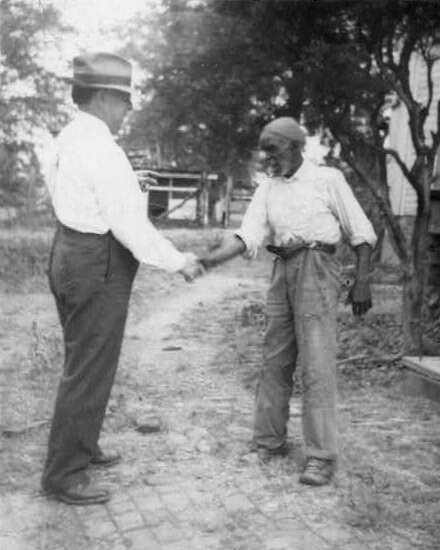John Avery Lomax - Preserver of America’s Folk Songs
Musicologist
Born: September 23, 1867, Goodman, Mississippi, U.S.A.
Died: January 26, 1948, Greenville, Mississippi, U.S.A.
John Avery Lomax was a passionate folklorist whose efforts safeguarded America’s folk traditions for future generations.
John was born in Goodman, Mississippi, on September 23, 1867. When he was two years old, his family traveled by ox cart to Texas, where he grew up on a farm. There, John first heard cowboy songs and folk music. At nine years old, he befriended Nat Blythe, a farmhand and former slave. John taught Nat to read and write, while Nat shared African American folk songs like “Big Yam Potatoes on a Sandy Land.” Though Nat later left the farm, the music he shared left a lasting impression.
John began his education at Granbury College in Texas, where he received what would be considered a high school education today. At 28, he enrolled as a freshman at the University of Texas at Austin. He wanted to study cowboy songs, but the university did not see folk music as a serious subject, so he pursued English literature instead. After earning his degree, he became a professor at Texas A&M University in 1904 and married Bess Baumman Brown.
In 1905, John left teaching to study at Harvard University, then the center for folklore research. There, professors George Lyman Kittredge and Barrett Wendell encouraged his interest in cowboy songs and folk ballads. Their support gave John the confidence to follow his passion. After earning a master’s degree in 1907, John returned to Texas to teach, but his dedication to folk music grew stronger. He applied for and received the Sheldon Fellowship Grant, which allowed him to travel across Texas recording cowboy songs. Using a wax cylinder phonograph, he preserved songs like “Home on the Range,” which had never been recorded before. In 1910, he published Cowboy Songs and Other Frontier Ballads, a groundbreaking book that received both critical acclaim and public praise.
The book’s success led John to co-found the Texas branch of the American Folklore Society with fellow professor Leonidas Payne. Their mission was to preserve America’s folk traditions before they were lost to time. New forms of music like jazz were being recorded and broadcast on the radio, but older folk songs, passed down orally, risked being forgotten. For seven years, John dedicated himself to the society, lecturing, researching, and collecting songs from across the country.
However, John’s career faced setbacks. He lost his position at Texas A&M and moved to Chicago, where he spent nearly a decade working in finance. Folk music took a back seat during this time. In 1931, tragedy struck when his wife died, and the stock market crash left him in financial trouble.
His oldest son, John Jr., encouraged him to return to his true passion: folk music. In 1932, John proposed a new anthology focused on American folk music, especially songs with African American roots. Macmillan Publishing approved his idea. Around this time, John began working with the Library of Congress. He offered to travel the country recording songs to expand their Archive of American Folk Song in exchange for recording equipment. He became the Archive’s Honorary Consultant and Curator, beginning a ten-year partnership that would define his legacy.
John traveled widely, often with his children, recording thousands of songs. His son Alan became his closest partner, and together they visited prison farms in Texas, believing prisoners cut off from radios preserved older songs. They also collected music from Spanish, French, and African American communities. Their work created one of the largest collections of folk music ever assembled.
John’s influence extended beyond music. He advised government projects such as the Federal Writers’ Project, where he helped document narratives from formerly enslaved people. In 1947, just one year before his death, he published his autobiography, which became a success.
John Avery Lomax died in January 1948 at the age of 80. His lifelong dedication to collecting and preserving folk music ensured that the songs and voices of America’s past would not be forgotten. Today, his work continues to inspire musicians, historians, and scholars, keeping alive the traditions he worked so hard to save.
SOURCES:
“John and Alan Lomax.” Acoustic Music, 26 Jan. 2023, acousticmusic.org/research/history/musical-styles-and-venues-in-america/john-and-alan-lomax/.
“John Avery Lomax (1867-1948).” The Library of Congress, www.loc.gov/item/n79148914/john-avery-lomax-1867-1948/.
Keywords: Arts, Science, Perseverance, Courage, Responsibility, Achievement, Make a Difference, Build Bridges to Unite
Image Citation: Public Domain

